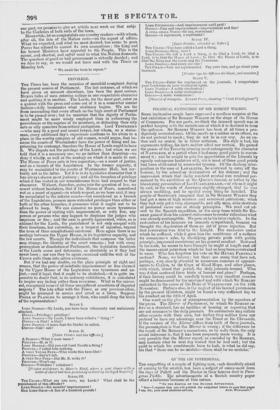PRIVILEGE.
THE Times has been the occasion of manifold complaint during the present session of Parliament. The last instance, of which we have given an account elsewhere, has been the most serious. BURNS talks of men entering college in one respectable character and quitting it in another. The Lords, for the most part, enter on a quarrel with the press and come out of it in a somewhat similar fashion—folly terminates what obstinacy begins. We are far from insinuating that every attack on the high court of Parliament is to be passed over ; but we maintain that the dignity of Parlia- ment might he more wisely employed than in subserving the peevishness or the caprice of its members, or defending their silly acts or silly speeches from critical castigation. Lord TENTERDEN —who may be a good and sound lawyer, but whom, as a states- man, every additional day's experience confirms in his claim to a place in the worthy category of old women, would argue, that be- cause the courts of Westminster have the power of fining and im- prisoning for contempt, therefore the House of Lords ought to have it. We dispute not the privilege of the Lords • but when we are told that it is a necessary one, we go farther ;Ilan disputing—we deny it wholly, as well as the analogy on which it is made to rest. The House of Peers acts in two capacities,—as a court of justice, and as a branch of the Legislature. In the former capacity, it may be assimilated to the courts of Westminster Hall, but cer- tainly not in the latter. Yet it is in its legislative character that it has always shown most jealousy ; and all the breaches of privilege which it has visited in our remembrance have had respect to that character. Without, therefore, going into the question of law, we assert without hesitation, that if the House of Peers, considered not as a court of appeal—in which respect, as we have said, it may be assimilated to the inferior courts—but considered as a branch of the Legislature, possess more extended privileges than either or both of the other branches, it possesses what it ought not to be allowed to keep. We can conceive no power more tyrannous than the power of visiting with imprisonment, or with fine, any person or persons who may happen to displease the judges who imprison or fine ; and the case is greatly aggravated, when, as is claimed for the Lords, the punishment is not only coequal with their functions, but extending, as a bequest of injustice, beyond the term of their constitutional existence. Here again there is no analogy between the Upper House, in its legislative capacity, and the law courts. Though the individuals that compose the latter may change, the identity of the court remains ; but with every prorogation or dissolution of Parliament, the legislative functions of the Lords cease and determine, as absolutely as if they had never been ; nor can they be again exercised until the writ of the Crown calls them into active existence.
But if we had any doubts, on the plain principle of right and reason, that the power of indefinite imprisonment or fine claimed by the Upper House of the Lecrislature was tyrannous and un- just,—and if legal, that it ought to be abolished,—it is quite im- possible to doubt that, in its ordinary exhibitions, it is calculated to inspire any feeling rather than reverence. What is the univer- sal, recognized issue of all these magnificent assertions of disputed majesty? The late affair with the Times, or any previous affair, might be arranged in scenes and acted as a farce. Suppose POOLE or PLANCHE to arrange it thus, who could deny the truth of the representation ?
LORD NOODLE—My Lords, you have been villanously and maliciously
attacked.
OMNES—Privilege I privilege ! LORD NOODLE—My Lords, I have been called a " thing !"
Omms—A libel I a libel !
LORD DOODLE—I move that the libeller be called.
Om-Es—Call! call I
SCENE II.
[Enter Printer and two Offioars.] A Bishop—What is your name ?
PRINTER—M. or N.
LORD DOODLE—Did you call Lord Noodle a thing? PRINTER—I called him nothing.
A VERY YOUNG PEER—Who wrote this here libel ?
PRINTER—Sha'n't tell.
A VERY OLD PEER—Did Mr. B. write it?
PRINTER—Won't say. OMNES—Withdraw withdraw I
[Printer withdraws to Oliver's Hotel, where a neat dinner with a bottle of claret had been previously ordered by his legal keepers.]
SCENE M.
THE CHAIR—What say you now, my Lords ? What shall be the
punishment of this offender?
LORD DOOME—Six months' imprisonment! Ow LORD GRIM—A fine of a hundred pounds !
SCENE I.
LORD EITHERSIDE—And imprisonment until paid I lam NES—Fine and imprisonment—imprisonment and fine! A STILL SMALL VOICE—Or say, reprimand !
OMNES—A reprimand, a reprimand !
SCENE IV.
[Enter Printer, attended as before.]
THE CHAIR—You have called a Lord a thing.
LORD DOODLE—Hear, hear THE CHAIR—To call a Lord a thing, is to libel a Lord; to libel a
Lord, is to libel the House of Lords ; to libel the House of Lords, is to libel the King and the Lords and the Commons.
Loan DOODLE—And every one else ! THE CHAIR—You are reprimanded. Pay your fees, and go about your
business. [Printer tips the Officers the blunt, and vanishes.]
SCENE V.
THE CHAIR—Enter the reprimand on the journals. I congratulate
your Lordships on your vindicated rights.
LORD NOODLE— A noble vindication !
LORD DOODLE—A noble vindication !
OMNES—A noble vindication !
[Flourish of trumpets. Exeunt Peers, shouting " Vivat Privilegium!"]


























 Previous page
Previous page